 Legendary folk singer and political activist Pete Seeger died of natural causes on January 27, his grandson told CNN. He was 94. Pictured, Seeger performs on stage in 1970.
Legendary folk singer and political activist Pete Seeger died of natural causes on January 27, his grandson told CNN. He was 94. Pictured, Seeger performs on stage in 1970. 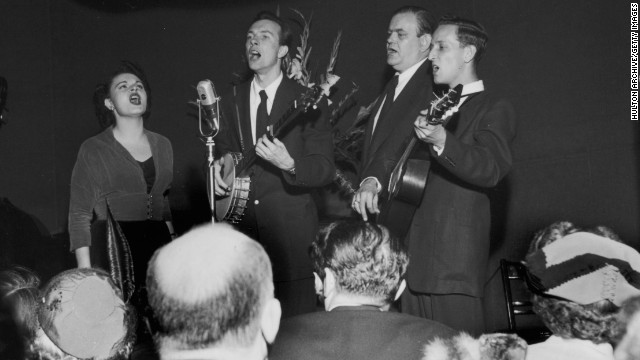 Seeger, center, performs with his group, the Weavers, at the Blue Angel nightclub in New York, circa 1948.
Seeger, center, performs with his group, the Weavers, at the Blue Angel nightclub in New York, circa 1948.  Musician Alan Lomax, center, and Seeger sing and play instruments as they practice for a concert in 1959.
Musician Alan Lomax, center, and Seeger sing and play instruments as they practice for a concert in 1959. 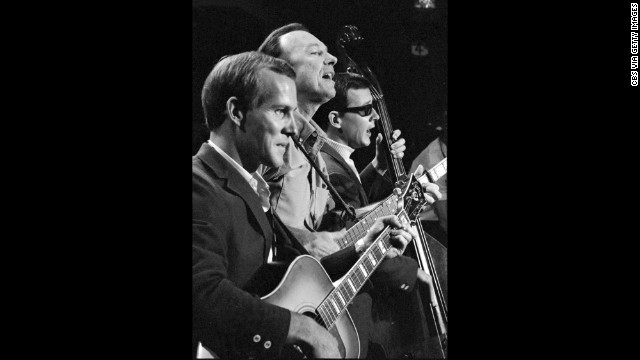 Seeger, center, appears as a musical guest on the Smothers Brothers Comedy Hour with Tom Smothers, left, and Dick Smothers in 1967.
Seeger, center, appears as a musical guest on the Smothers Brothers Comedy Hour with Tom Smothers, left, and Dick Smothers in 1967.  Seeger appears with Johnny Cash on "The Johnny Cash Show" in 1970.
Seeger appears with Johnny Cash on "The Johnny Cash Show" in 1970.  Seeger participates in a shoreside festival at the Hudson River in New York in 1978.
Seeger participates in a shoreside festival at the Hudson River in New York in 1978.  Seeger, from left, Lee Hays, Ronnie Gilbert and Fred Hellerman rehearse for a reunion concert of the Weavers in 1980.
Seeger, from left, Lee Hays, Ronnie Gilbert and Fred Hellerman rehearse for a reunion concert of the Weavers in 1980.  Seeger poses for a photograph in Beacon, New York, in 1995.
Seeger poses for a photograph in Beacon, New York, in 1995.  Seeger participates in a protest march in New York City on the eve of the 2004 Republican National Convention.
Seeger participates in a protest march in New York City on the eve of the 2004 Republican National Convention.  Seeger performs with Tao Rodriguez-Seeger, left, and Bruce Springsteen, right, at "We Are One: The Obama Inaugural Celebration At The Lincoln Memorial" in 2009.
Seeger performs with Tao Rodriguez-Seeger, left, and Bruce Springsteen, right, at "We Are One: The Obama Inaugural Celebration At The Lincoln Memorial" in 2009.  Seeger performs during the 2009 Dorothy and Lillian Gish Prize special outdoor tribute at Hunts Point Riverside Park in New York City in 2009.
Seeger performs during the 2009 Dorothy and Lillian Gish Prize special outdoor tribute at Hunts Point Riverside Park in New York City in 2009.  Seeger sings with Occupy Wall Street protesters in October 2011 in New York City.
Seeger sings with Occupy Wall Street protesters in October 2011 in New York City.
- Pete Seeger dies of natural causes in a New York hospital, his family says
- His career spanned more than 70 years, often courting controversy
- He is known for songs like "Where Have All the Flowers Gone"
(CNN) -- Pete Seeger, the man considered to be one of the pioneers of contemporary folk music who inspired legions of activist singer-songwriters, died Monday.
He was 94.
Seeger's best known songs include "Where Have All the Flowers Gone," "Turn! Turn! Turn! (To Everything There Is a Season)" and "If I Had a Hammer (The Hammer Song)."
But his influence extended far beyond individual hits.
 Folk icon Pete Seeger dies at 94
Folk icon Pete Seeger dies at 94 
 Click through to see people who passed away in 2014.
Click through to see people who passed away in 2014. 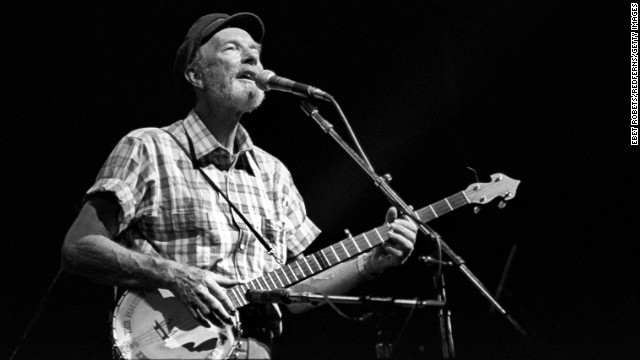 Legendary folk singer Pete Seeger, known for classics such as "Where Have All the Flowers Gone" and "If I Had a Hammer (The Hammer Song)," died of natural causes in New York, his grandson told CNN. He was 94.
Legendary folk singer Pete Seeger, known for classics such as "Where Have All the Flowers Gone" and "If I Had a Hammer (The Hammer Song)," died of natural causes in New York, his grandson told CNN. He was 94. 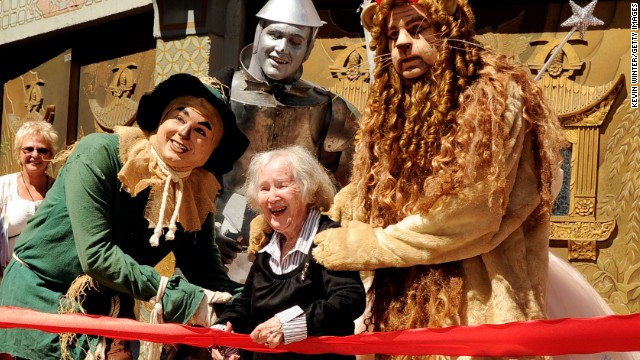 Ruth Robinson Duccini, who played one of the Munchkins in the 1939 classic "The Wizard of Oz," died on January 16. She was 95.
Ruth Robinson Duccini, who played one of the Munchkins in the 1939 classic "The Wizard of Oz," died on January 16. She was 95.  Former Playboy centerfold Cassandra Lynn Hensley was found dead at a friend's home in Los Angeles, the coroner there said on January 17. Hensley was 34. Her cause of death was not immediately known.
Former Playboy centerfold Cassandra Lynn Hensley was found dead at a friend's home in Los Angeles, the coroner there said on January 17. Hensley was 34. Her cause of death was not immediately known. 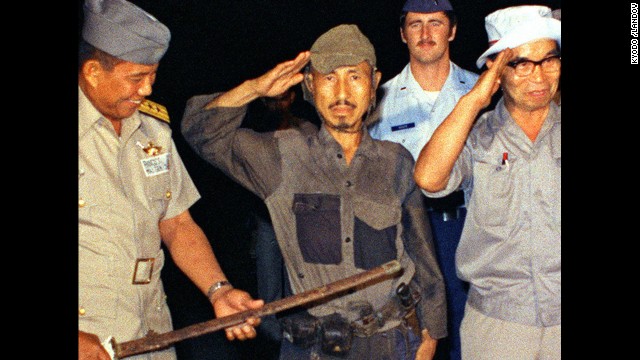 Hiroo Onoda, center, salutes after handing over his military sword on Lubang Island in the Philippines in March 1974. Onoda, a former intelligence officer in the Japanese army, had remained on the island for nearly 30 years, refusing to believe his country had surrendered in World War II. He died at a Tokyo hospital on January 16. He was 91.
Hiroo Onoda, center, salutes after handing over his military sword on Lubang Island in the Philippines in March 1974. Onoda, a former intelligence officer in the Japanese army, had remained on the island for nearly 30 years, refusing to believe his country had surrendered in World War II. He died at a Tokyo hospital on January 16. He was 91.  Russell Johnson, center, stands with Alan Hale Jr., left, and Bob Denver in an episode of "Gilligan's Island" in 1966. Johnson, who played "the professor" Roy Hinkley in the hit television show, passed away January 16 at his home in Washington state, according to his agent, Mike Eisenstadt. Johnson was 89.
Russell Johnson, center, stands with Alan Hale Jr., left, and Bob Denver in an episode of "Gilligan's Island" in 1966. Johnson, who played "the professor" Roy Hinkley in the hit television show, passed away January 16 at his home in Washington state, according to his agent, Mike Eisenstadt. Johnson was 89.  Ariel Sharon, whose half century as a military and political leader in Israel was marked with victories and controversies, died on January 11 after eight years in a coma, Israeli Army Radio reported. Sharon was 85.
Ariel Sharon, whose half century as a military and political leader in Israel was marked with victories and controversies, died on January 11 after eight years in a coma, Israeli Army Radio reported. Sharon was 85.  Franklin McCain, seen center wearing glasses, one of the "Greensboro Four," who made history for their 1960 sit-in at a Greensboro Woolworth's lunch counter, died on January 10 after a brief illness, according to his alma mater, North Carolina A&T State University.
Franklin McCain, seen center wearing glasses, one of the "Greensboro Four," who made history for their 1960 sit-in at a Greensboro Woolworth's lunch counter, died on January 10 after a brief illness, according to his alma mater, North Carolina A&T State University.  Larry Speakes, who served as President Ronald Reagan's press secretary, died January 10 at his home in Cleveland, Mississippi, following a lengthy illness, according to Bolivar County Coroner Nate Brown. He was 74.
Larry Speakes, who served as President Ronald Reagan's press secretary, died January 10 at his home in Cleveland, Mississippi, following a lengthy illness, according to Bolivar County Coroner Nate Brown. He was 74. 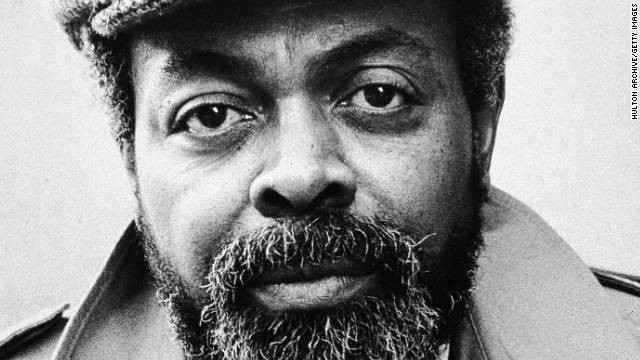 Poet Amiri Baraka, who lost his post as New Jersey's poet laureate because of a controversial poem about the 9/11 terror attacks, died January 9, his agent said. Baraka was 79.
Poet Amiri Baraka, who lost his post as New Jersey's poet laureate because of a controversial poem about the 9/11 terror attacks, died January 9, his agent said. Baraka was 79. 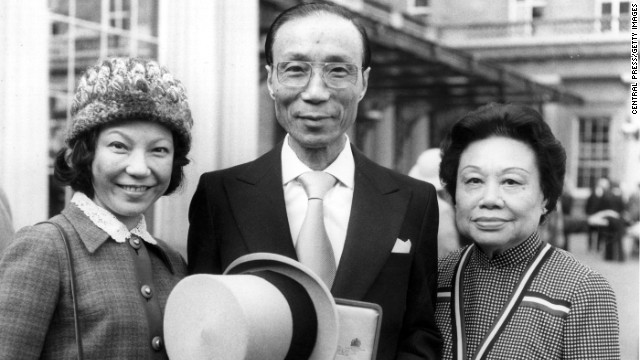 Sir Run Run Shaw, the media tycoon who helped bring Chinese martial arts films to an international audience, died at his home in Hong Kong on January 7 at age 106, the television station he founded said.
Sir Run Run Shaw, the media tycoon who helped bring Chinese martial arts films to an international audience, died at his home in Hong Kong on January 7 at age 106, the television station he founded said. 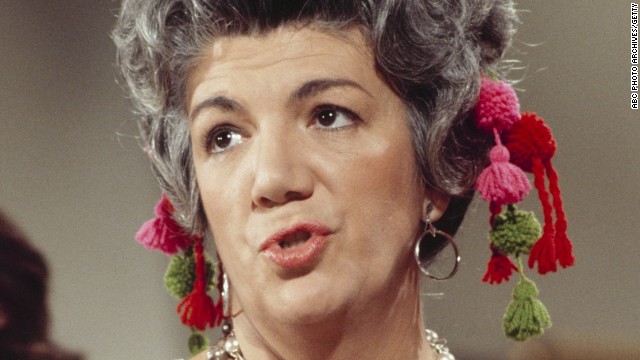 Stage, TV and film actress Carmen Zapata, who founded the Bilingual Foundation of the Arts as a means of of introducing "the rich and eloquent history of the diverse Hispanic culture to English-speaking audiences," died on January 5 at her Los Angeles home. She was 86.
Stage, TV and film actress Carmen Zapata, who founded the Bilingual Foundation of the Arts as a means of of introducing "the rich and eloquent history of the diverse Hispanic culture to English-speaking audiences," died on January 5 at her Los Angeles home. She was 86. 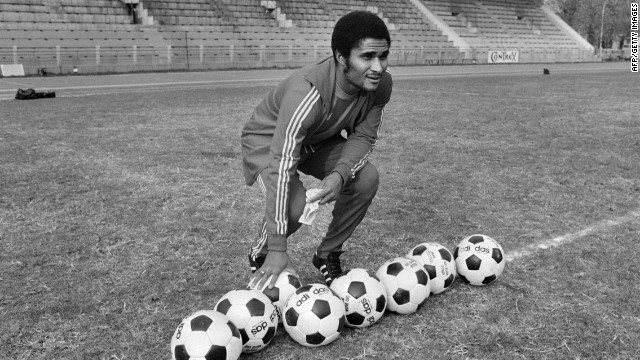 Portugal football legend Eusebio, who was top scorer at the 1966 World Cup, died from a heart attack on January 5 at age 71, said his former club, Benfica.
Portugal football legend Eusebio, who was top scorer at the 1966 World Cup, died from a heart attack on January 5 at age 71, said his former club, Benfica. 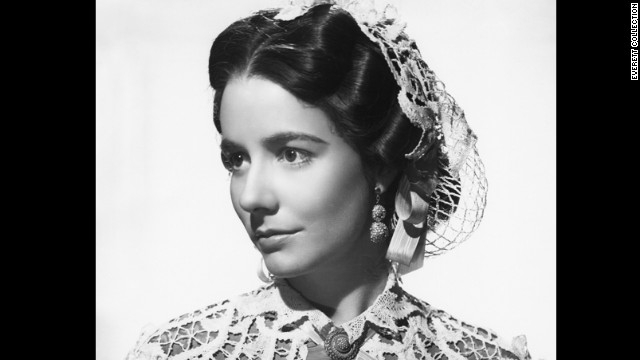 Alicia Rhett, who had been one of the oldest surviving cast members of the classic film "Gone With the Wind," died on January 3 in her longtime hometown of Charleston, South Carolina, a retirement community spokeswoman said. She was 98.
Alicia Rhett, who had been one of the oldest surviving cast members of the classic film "Gone With the Wind," died on January 3 in her longtime hometown of Charleston, South Carolina, a retirement community spokeswoman said. She was 98.  Singer Phil Everly, left -- one half of the groundbreaking, smooth-sounding, record-setting duo the Everly Brothers -- died on January 3, a hospital spokeswoman said. He was 74.
Singer Phil Everly, left -- one half of the groundbreaking, smooth-sounding, record-setting duo the Everly Brothers -- died on January 3, a hospital spokeswoman said. He was 74.  Photos: People we lost in 2014
Photos: People we lost in 2014 His grandson Kitama Cahill Jackson told CNN that the singer died of natural causes at New York Presbyterian Hospital on Monday evening.
Familiar with controversy
In a career spanning more than 70 years, Seeger frequently courted controversy.
"He lived at a time when so many things hadn't been done yet, the idea of making music about something hadn't really been done," Jackson said. "And now people do it all the time."
Seeger's opinions didn't always sit well with authorities.
"From the start, he aspired to use folk music to promote his left-wing political views, and in times of national turmoil that brought him into direct confrontation with the U.S. government, corporate interests, and people who did not share his beliefs," William Ruhlmann wrote in a biography on allmusic.com. "These conflicts shaped his career."
Early career
In 2009, Seeger talked to CNN about the beginnings of his music career in the late 1930s.
"I come from a family of teachers, and I was looking for a job on a newspaper and not getting one," he said in the interview. "I had an aunt who said, 'Peter, I can get five dollars for you if you come and sing some of your songs in my class.' Five dollars? In 1939, you would have to work all day or two days to make five dollars. It seemed like stealing."
But Seeger said he took his aunt up on the offer.
"Pretty soon I was playing school after school, and I never did work on a newspaper," he said "You don't have to play at nightclubs, you don't have to play on TV, just go from college to college to college, and the kids will sing along with you."
Last days
Jackson, Seeger's grandson, said the singer-songwriter had heart surgery in December to replace a valve, which had gone well and had nothing to do with his death.
He said Seeger was in the hospital for six days before his death.
He couldn't speak for the last three days, Jackson said, but his mind never went away and he continued to recognize people.
"He was a second father to me, he was a friend, he was a best friend," Jackson said. "He was just this wonderful, genuine person."
People we've lost in 2014
CNN's Julie Cannold contributed to this report.
No comments:
Post a Comment